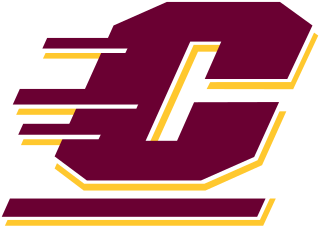
The National Collegiate Athletic Association (NCAA) is a nonprofit organization that regulates student athletics among about 1,100 schools in the United States, and one in Canada. It also organizes the athletic programs of colleges and helps over 500,000 college student athletes who compete annually in college sports. The headquarters is located in Indianapolis, Indiana.

The Association for Intercollegiate Athletics for Women (AIAW) was a college athletics organization in the United States, founded in 1971 to govern women's college competitions in the country and to administer national championships. It evolved out of the "Commission on Intercollegiate Athletics for Women" (CIAW), founded in 1967. The association was one of the biggest advancements for women's athletics on the collegiate level. Throughout the 1970s, the AIAW grew rapidly in membership and influence, in parallel with the national growth of women's sports following the enactment of Title IX.

Rocky Mountain College is a private college in Billings, Montana, United States. It offers 50 liberal arts and professional majors in 24 undergraduate disciplines. As of 2013, the college had 1,069 enrolled students. RMC is affiliated with the United Methodist Church, the Presbyterian Church (USA), and the United Church of Christ.

College athletics in the United States or college sports in the United States refers primarily to sports and athletic training and competition organized and funded by institutions of tertiary education in a two-tiered system.

The Clarkson Golden Knights are composed of 20 teams representing Clarkson University in intercollegiate athletics, including men and women's alpine skiing, basketball, cross country, ice hockey, lacrosse, nordic skiing, soccer, and swimming. Men's sports include baseball and golf. Women's sports include softball and volleyball. The Golden Knights compete in the NCAA Division III and are members of the Liberty League for all sports except ice hockey, which competes in NCAA Division I, as a member of ECAC Hockey.

Oakland City University (OCU) is a private university affiliated with the General Baptist Church and located in Oakland City, Indiana. It is the only General Baptist Church-affiliated college or university in the United States. Founded in 1885, it has slowly grown to the present student enrollment of about 1,200 on the main campus and, counting all sites, about 2,000 total.

The Miami RedHawks are the National Collegiate Athletic Association (NCAA) Division I intercollegiate athletic teams that represent Miami University in Oxford, Ohio, United States. Miami is a member of the Mid-American Conference (MAC) and sponsors teams in nine men's and ten women's NCAA sanctioned sports; the RedHawks hockey team is a member of the National Collegiate Hockey Conference. With sponsorship of men's swimming & diving transferring from the MAC to the Missouri Valley Conference in 2024–25, Miami will become a single-sport member of the latter. The football team competes in the Football Bowl Subdivision (FBS), the highest level for college football. The RedHawks are arch-rivals with the Ohio Bobcats. In box scores for sporting events, the RedHawks sports teams are usually referred to as Miami (OH) to differentiate from the Miami Hurricanes, a Division I school in Florida.

The Central Michigan Chippewas are the intercollegiate athletic teams that represent Central Michigan University (CMU), located in Mount Pleasant, Michigan. The school fields sixteen men's and women's intercollegiate teams that compete at the National Collegiate Athletic Association (NCAA) Division I level.

The Navy Midshipmen are the athletic teams that represent the United States Naval Academy. The academy sponsors 36 varsity sports teams and 12 club sport teams. Both men's and women's teams are called Navy Midshipmen or Mids. They participate in the NCAA's Division I, as a non-football member of the Patriot League, a football-only member of the American Athletic Conference in the Football Bowl Subdivision (FBS), and a member of the Collegiate Sprint Football League (men), Eastern Association of Rowing Colleges (men), Eastern Association of Women's Rowing Colleges, Eastern Intercollegiate Gymnastics League (men), Mid-Atlantic Squash Conference (men) and Eastern Intercollegiate Wrestling Association. Navy is also one of approximately 300 members of the Eastern College Athletic Conference (ECAC).

The Middlebury Panthers are the 31 varsity teams of Middlebury College that compete in the New England Small College Athletic Conference. The Panthers lead the NESCAC in total number of national championships, having won 42 team titles since the conference lifted its ban on NCAA play in 1994. Middlebury enjoys national success in soccer, cross country running, field hockey, men's basketball, women's hockey, skiing, men's lacrosse and women's lacrosse, and fields 31 varsity NCAA teams and several competitive club teams including a sailing team (MCSC), a crew team, a water polo team, an ultimate frisbee team, and a rugby team. Since 2000, Middlebury's varsity squads have won 84 NESCAC titles. Currently, 28% of students participate in varsity sports.
The United States Collegiate Ski and Snowboard Association (USCSA) is the sports federation for collegiate skiing and snowboarding in the United States. With over 180 member colleges, the USCSA fields some 5,000 men and women, alpine, Nordic, freeski and snowboard athletes in over 200 competitive events annually. The organization offers alpine skiing, Nordic skiing, freestyle skiing and snowboarding.

The Denver Pioneers are the sports teams of the University of Denver (DU). They play in the National Collegiate Athletic Association (NCAA) Division I, and have amassed 35 NCAA titles as of 2024, which is in the top 15 among all schools. Denver is a member of The Summit League for men's and women's basketball, swimming and diving, men's and women's soccer, tennis and golf for both men and women, plus women's volleyball. Other DU teams play in various conferences in the sports that are not sponsored by The Summit. The men's ice hockey team is a charter member of the National Collegiate Hockey Conference (NCHC), which formed in 2011 with play beginning in 2013. The lacrosse teams for men and women are members of the Big East Conference; the men began Big East play in the 2013–14 school year, while the women left the Mountain Pacific Sports Federation (MPSF) after the 2016 lacrosse season. Men's and women's skiing compete in the Rocky Mountain Intercollegiate Ski Association, while the women's gymnastics team became an affiliate of the Big 12 Conference starting with the 2015–16 season.
The first tier of intercollegiate sports in the United States includes sports that are sanctioned by one of the collegiate sport governing bodies. The major sanctioning organization is the National Collegiate Athletic Association (NCAA). Before mid-1981, women's top-tier intercollegiate sports were solely governed by the Association for Intercollegiate Athletics for Women (AIAW). Smaller colleges are governed by the National Association of Intercollegiate Athletics (NAIA). Two-year colleges are governed by the National Junior College Athletic Association (NJCAA) in most of the country, except for the unaffiliated California Community College Athletic Association (CCCAA) and Northwest Athletic Conference (NWAC).
The Michigan State University Men's Volleyball Club was founded in the late 1950s and revived as a registered student organization at Michigan State University in 1987. It is currently a founding member of the Midwestern Intercollegiate Volleyball Association ("MIVA"), and registered with the National Collegiate Volleyball Federation ("NCVF"). The club competes in MIVA organized intercollegiate club competitions throughout the season and the season-ending NCVF National Championships. The club currently has four teams with progressive skill levels—Green, White, Posse, and Greenhorns. Club teams practice at the IM West Sports Arena and participate in a variety of club fundraising and community outreach and supportive activities, like Special Olympics and fundraising for the Greater Lansing Food Bank.

Salve Regina University competes on the NCAA Division III level and is a member of the Commonwealth Coast Conference and Commonwealth Coast Football. The university offers ten varsity sports for women, eight for men, and one co-ed sport (sailing). Sailing is governed by the Inter-Collegiate Sailing Association, and its subdivision, the New England Intercollegiate Sailing Association.
The school also offers men's and women's rugby, governed by the Colonial Coast Rugby Conference, USA Rugby and the International Rugby Board. The men's rugby program competes at the Division III level, and the women's program competes on the Division III level in the National Small College Rugby Organization.

The Minnesota Duluth Bulldogs are the athletic teams that represent the University of Minnesota Duluth. They were first named Bulldogs in 1933. Their colors are maroon and gold. The school competes in the NCAA's Division II and the Northern Sun Intercollegiate Conference in all sports except ice hockey. The men's team competes in the National Collegiate Hockey Conference, and the women's hockey program compete in the Western Collegiate Hockey Association. Both hockey conferences are Division I. They are also known for having a strong club sports program, especially in ultimate frisbee, lacrosse, rugby, alpine skiing and ice hockey.

The Northern Michigan Wildcats are the athletic teams that represent Northern Michigan University, located in Marquette, Michigan, in NCAA intercollegiate sporting competitions. All teams that play under NCAA governance compete at the Division II level, with three exceptions. The most significant one is the men's ice hockey program, which plays at the Division I level. Two other sports, Nordic skiing and women's wrestling, are de facto Division I sports; the NCAA holds a single skiing championship open to members of all three divisions, and does not currently include women's wrestling in its divisional structure. While NMU's skiing program includes both disciplines contested in the NCAA championships, only the Nordic program competes within the NCAA structure.

The Colby Mules are the varsity and club athletic teams of Colby College, a liberal arts college located in Waterville, Maine. Colby's varsity teams compete in the New England Small College Athletic Conference of the National Collegiate Athletic Association (NCAA) Division III. The college offers 32 varsity teams, plus club sports, intramural sports called I-play.

College sports or college athletics encompasses non-professional, collegiate and university-level competitive sports and games.
















